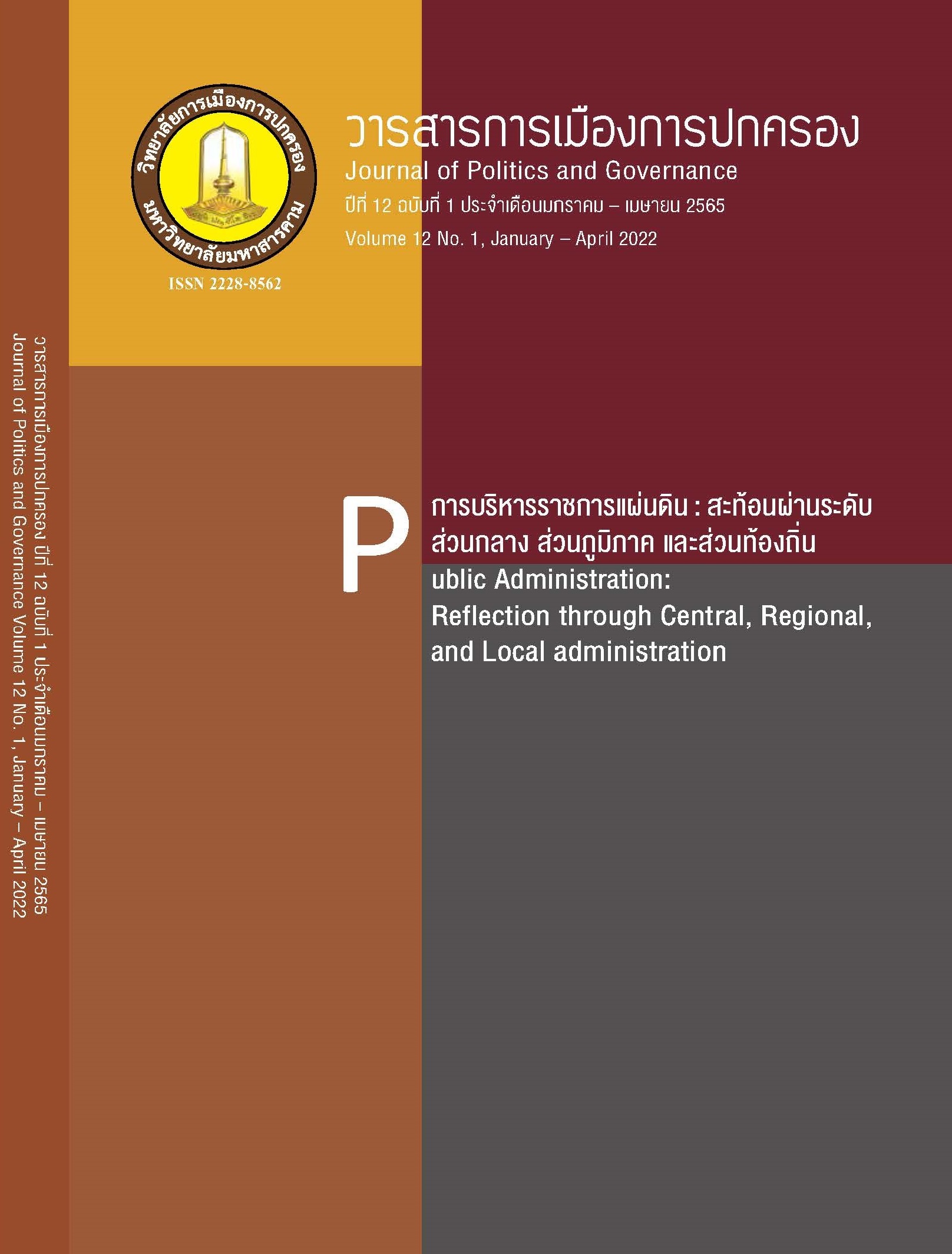Islamic State: the Truth from the Doctrine and the Illusion Created
Main Article Content
Abstract
The objectives of this research article are 1) To study the concept of Political ideology “Islamic State” of Prophet Muhammad in establishing the Islamic State of Medina. 2) To study the Political Ideology on "Islamic State" of IS Movement. 3) To compare the Political ideology of the "Islamic State" between the Prophet Muhammad and the IS. 4) To study the concepts of the IS that changed from the Prophet Muhammad and 5) To study the impact of IS concept to Thai society. The results of study found that 1) The reality of Islamic rule is the state was formed during the Prophet Mohammed's reign which used the Medina Constitution to accept the coexistence of people in society with peace, non-violence, to rule both Muslim and non-Muslim. 2) The IS group is a Sunni movement that has the concept and method of demanding justice for Islam by using the Qur'an and the Prophet's example (Sunnah), but the IS has adopted certain principles That is specifically about violence in the war that Islam has experienced in the past become a driving force for negative power and calling for people to join in the fight according to the methods of the movement. 3) Compared to the IS, it is found that the management style and concepts used have increased the thought of their own beliefs in administrative management. IS denied differences use force to enslave the opponents to accept their power. 4) The conceptual methods used during the Prophet's time are considered peaceful and full of mutual cooperation between Muslims and non-Muslims, but for the movement's groups, it is forcing people to be under Commanding and oppressing the people, causing conflicts and wars. 5) The idea of establishing the Islamic State in the movement has resulted in the fear of Islam. As a result, many areas in Thailand are anti-Islam.
Article Details
References
คุรชีด อะห์หมัด. (2541). อิสลาม: ความหมายและคำสอน (จรัญ มะลูลีม, ผู้แปล). กรุงเทพฯ: อิสลามิคอะเคเดมี.
จรัญ มะลูลีม. (2557). รัฐอิสลามในอิรักและซีเรีย. จุลสารความมั่นคงศึกษา, พฤศจิกายน 2557, น.149.
______. (2559). โลกมุสลิมกับการก่อการร้าย. จุลสารความมั่นคงศึกษา, เมษายน 2559, น.171.
______. (2563, 11 กุมภาพันธ์). ศาสตราจารย์คณะรัฐศาสตร์ มหาวิทยาลัยธรรมศาสตร์ [บทสัมภาษณ์].
ศราวุฒิ อารีย์. (2563, 11 กุมภาพันธ์). ผู้อำนวยการศูนย์มุสลิมศึกษา สถาบันเอเชียศึกษา จุฬาลงกรณ์มหาวิทยาลัย [บทสัมภาษณ์].
มุสตอฟา อัสสิบาอีย์. (2554). วิเคราะห์บทเรียนและข้อคิดจากชีวประวัติท่านศาสดามุฮัมมัด (ศ็อลลัลลอุอะลัยฮิวะซัลลัม) (ฆอซาลี เบ็ญหมัด ผู้แปล). สงขลา: มูลนิธิเพื่อการส่งเสริมและพัฒนาสังคม.
มัสลัน มาหามะ. (2551). อิสลามวิถีแห่งชีวิต. สงขลา: สถาบันวิจัยระบบสุขภาพภาคใต้มหาวิทยาลัยสงขลานครินทร์.
ศอลิห์ หุสัยน์ อัลอายิด. (2548). สิทธิของชนต่างศาสนิกในประเทศอิสลาม (อุษมาน อิดริส, ผู้แปล). ปัตตานี: วิทยาลัยอิสลามยะลา.
สมาคมนักเรียนเก่าอาหรับ ประเทศไทย. (2542). พระมหาคัมภีร์อัลกุรอานพร้อมความหมายภาษาไทย. อัลมะดีนะฮฺอัลมุเนาวะเราฮฺ: ศูนย์กษัตริย์ฟาฮัดเพื่อการพิมพ์อัลกุรอาน.
สามารถ ทองเฝือ. (2562). อิสลามกับการเมือง. ปัตตานี: ปาตานีฟอรั่ม.
อาทิตย์ ทองอินทร์. (2563, 12 กุมภาพันธ์). อาจารย์มหาวิทยาลัยสุโขทัยธรรมาธิราช [บทสัมภาษณ์].
อณัส อมาตยกุล. (2563, 12 กุมภาพันธ์). อดีตอาจารย์มหาวิทยาลัยมหิดล [บทสัมภาษณ์].
อับดุลรอนิง สือแต, อุสมาน ยุนุ๊, และไฟซ๊อล หะยีอาวัง. (2563, 18 กุมภาพันธ์) อาจารย์มหาวิทยาลัยสงขลานครินทร์ [สนทนากลุ่ม].
อิมรอน มะลูลีม. (2536). มุฮัมมัดศาสดาแห่งอิสลาม. กรุงเทพฯ: อิสลามมิคอะคาเดมี.
Bowering, Gerhard. (2013). The Princeton Encyclopedia of Islamic Political Thought. New Jersey: Princeton University Press.
Esposito, John L. (2003). The Oxford Dictionary of Islam. New York: Oxford University Press.
Fernando PM Tambunan. (2014). Sejarah dan Ideologi ISIS (Islamic State of Iraq and Sham). Jakarta, Indonesia: Kajian Ketahanan Nasonal, Kekhususan Kajian Stratejik Intelijen, Program Pascasarjana, Universiti Indonesia, Jakarta.
Gerges. A. Fawaz. (2014). ISIS and the Third Wave of Jihadism. Boston, United States: University of Boston.
Hamidullah, Muhammad. (2007). The Prophet’s Establishing A State and His Succession. New Delhi: Adam Publishers and Distributors.


